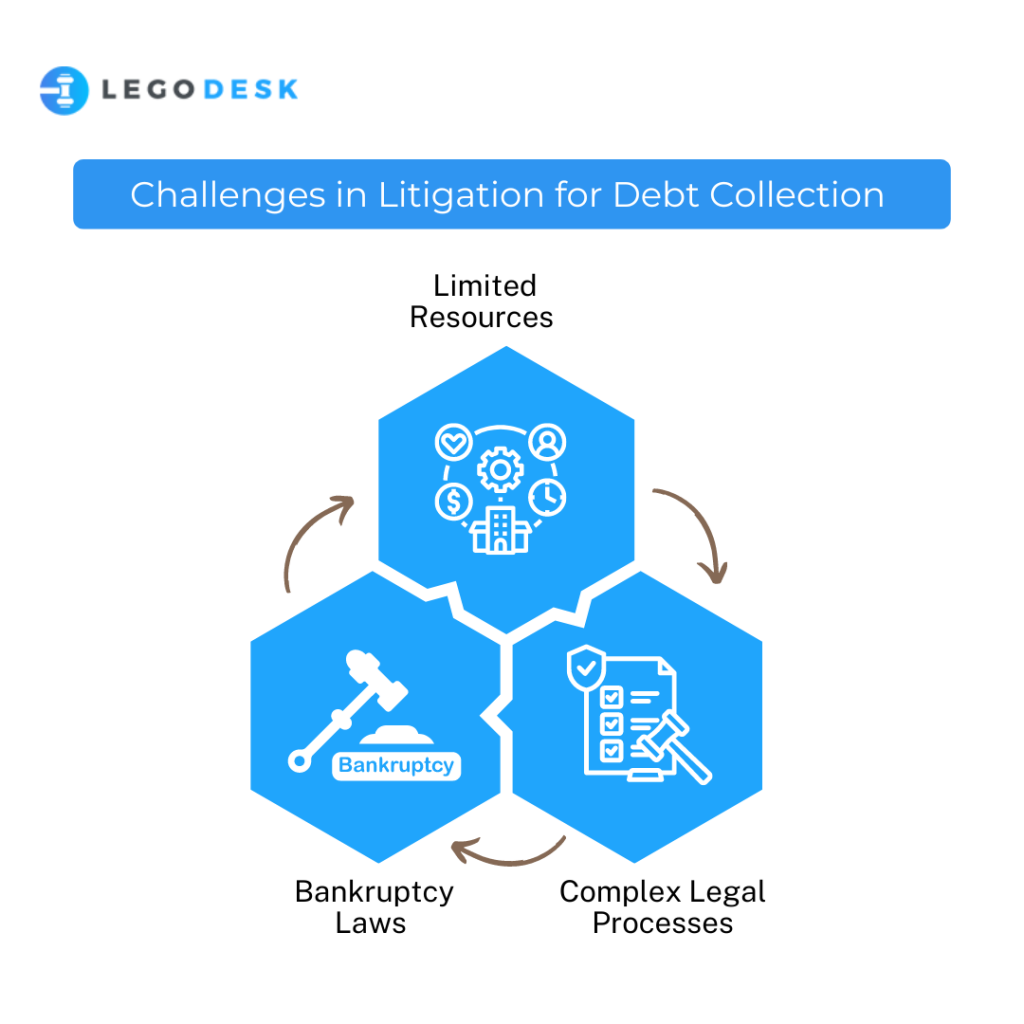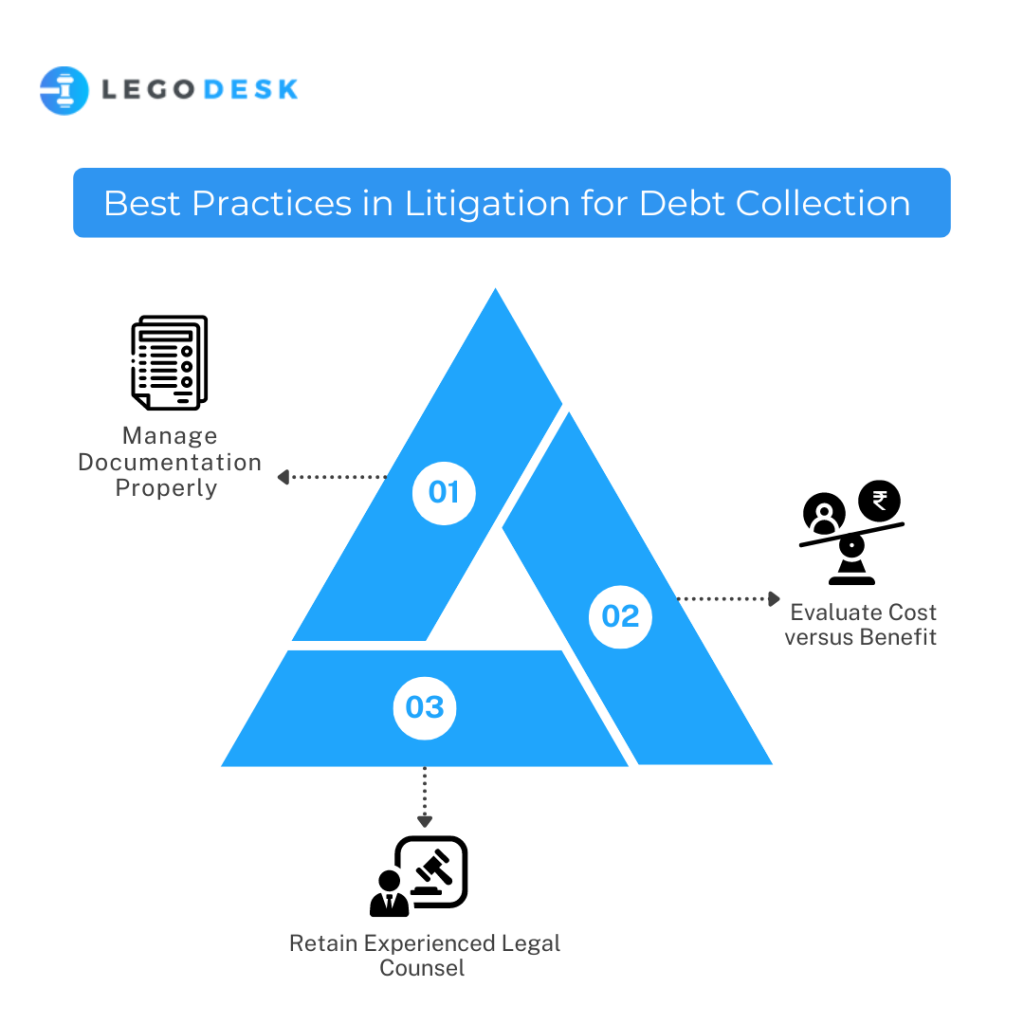Litigation in Debt Collection: Challenges and Best Practices
Legal collection is usually the final course of action that lenders take to recover as much as possible from a non-performing asset. Litigation involves approaching courts of law for assistance in recovering dues by lenders.
Usually, in India, the legal collection process starts with approaching the specialized Debt Recovery Tribunals or the National Company Law Tribunal that have been established for such cases. In case the matter escalates, lenders may have to make their claims before other civil courts like the High Court as well.
While litigation is a tried and true method for lenders, there are several challenges that arise and it’s important for lenders to follow the proven best practices before and during all collection process steps. Let’s dive into a few pointers that can help lenders navigate the justice system.
Challenges in Litigation for Debt Collection

Limited Resources
The primary challenge that lenders face when approaching the courts is that the process is highly expensive in terms of both time and money.
Lenders need to hire specialized legal assistance for debt collection to help navigate the legal process. Lawyers need to be involved and they can either be hired in-house or outsourced legal teams can be utilized. Larger lenders usually find that using a combination of both is best.
While legal help forms the majority of the cost, it’s not the only cost that is involved.
Court fees must be paid and other teams such as the sales team and the collection team need to be involved to assist the legal team with preparing the case against the defaulter. This adds to the cost of litigation.
Complex Legal Processes
To make matters more difficult, laws are complex and especially so when it comes to debt recovery matters. The law attempts to do its best for all parties involved and to ensure that justice prevails. However, this is much easier said than done and the result is a Kafkaesque process that ends up making matters more difficult for all parties involved.
Some of the reasons why navigating the legal system is difficult is because the there are many moving parts that have to come together before a resolution can be reached. The borrower must be heard, the lender must make their case, the court dates must be available, and so on. Overall, the process can be full of frustration for the lender even when they have the right claim.
Bankruptcy Laws
Further, bankruptcy laws play a major role in how many debt claims are settled. India has enforced a new code on bankruptcy called the Insolvency and Bankruptcy Code, 2016 which has brought major changes to debt settlement once bankruptcy has been declared.
This statute gives lenders the power to move court for the settlement of dues, however, a lengthy procedure must be followed before the claims are finally settled.
While parts of the new law have been designed to make the process more transparent and efficient, many criticisms have also been made regarding the some of the provisions of the statute. Lenders will need to make sure that they approach court with the right frame of mind and with their hands clean to help ensure a positive outcome.
Best Practices in Litigation for Debt Collection

Manage Documentation Properly
Documentation is the backbone of the lending business.
Every lender needs to ensure that all the documentation has been done properly, in line with the extant laws of the state, all the relevant taxes have been paid, the execution of the documents have been done properly, and all the documents are stored and managed properly and can be retrieved and restored again and again without issue. The debt collection services need to apprised of the importance of documentation in case outsourced services are used.
An emphasis needs to be paid to proper documentation because without it no court of law will entertain any claims by any lender. It may become easy for the opposition counsel to dismiss your claims on the grounds that your documentation is faulty and the court may have to agree.
Evaluate Cost versus Benefit
Litigation is not worth pursuing every time. Lenders need to conduct a case-by-case analysis of whether initiating litigation proceedings makes financial sense. There are many instances when the amount which is due is too small for it to be worthwhile initiating legal proceedings. This is because regardless of the loan amount, the legal process will be expensive.
The amount that lawyers charge does not depend on the amount of the loan that is due. The court fees and other processes that need to be followed also remain the same. Hence, only minor savings can be made when initiating legal proceedings when the loan amount is small compared to when it is large.
Retain Experienced Legal Counsel
Many lenders may be tempted to scrimp on the legal counsel that they hire for handling the case. However, this can lead to a more expensive outcome. Usually, lawyers who charge more do so for a very good reason. The legal system is incredibly complex and it needs experienced hands to effectively navigate through it.
Lenders who are experienced with debt settlement cases usually prefer hiring good legal counsel since they know that it usually results in higher settlements and lower cost over the long term.
How Can Legodesk Help?
Legodesk is proud to present its software platform which has been specially designed to help meet the debt collection needs of institutional lenders and enterprises.
Our platform boasts a range of intuitive and helpful features such as legal notice automation that can help streamline the litigation process and case management that can help lenders keep track of their outstanding cases.
The platform doesn’t just assist once legal proceedings have been initiated but throughout the debt collection process including when the asset is performing as it should.
Legodesk is trusted by reputed banks, NBFCs, and enterprises to help make the overall debt collection process easier and more cost-effective.
Wrapping Up
Legal proceedings can be a resource-heavy process, however, lenders can take several steps to ensure a positive outcome.
It is important to remember that legal collection proceedings should only be initiated in case all other attempts at negotiation, settlement, mediation, and resolution are of no avail.
Legal boundaries of debt collection in India also need to be kept in mind before initiating proceedings.
